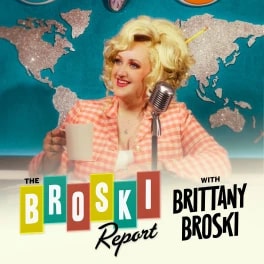

This article is an excerpt from the Shortform guide to "The Broski Report with Brittany Broski". Shortform has the world's best summaries and analyses of books, podcasts, and more.
Like this article? Sign up for a free trial here.
Is communication with aliens possible? How does the film Arrival portray the relationship between aliens and humans?
With the skill of a seasoned storyteller, Brittany Broski navigates the blurred lines between fiction and reality on her podcast The Broski Report. She references the 2017 film Arrival to reflect on human nature and the possibility of alien diplomacy.
Keep reading to learn more about hypothetical engagement with aliens.
Comedic Imaginings: Diplomacy With Extraterrestrials
On her podcast The Broski Report, Brittany Broski playfully imagines her interactions with extraterrestrials, showcasing her belief in her own ability to successfully communicate and even engage in diplomacy with aliens, hypothetically imagining scenarios with political figures such as President Joe Biden.
She also jests about the advantages and possible pitfalls of diplomatic immunity, humorously contemplating its use for minor illicit acts like theft and escaping debts.
Arrival Recap: Communication Beyond the Stars
Broski further revisits the film Arrival with its compelling narrative on communication with aliens and the human reaction to the unknown. In the realm of pop culture references, particularly within science fiction and movies, familiarity with the film Arrival is beneficial for understanding this article.
Directed by Denis Villeneuve in 2016, Arrival delves into themes such as extraterrestrial communication and diplomacy. The film follows linguist Louise Banks (played by Amy Adams) as she attempts to decipher an alien language after their arrival on Earth. Blurring the lines between fiction and reality is a central theme explored in both metafictional works and Arrival.
Broski adds a critique of Amy Adams and Jeremy Renner’s roles, specifically highlighting the scene where the alien places its appendage on the glass as a humorous metaphor. She comically asserts that in a real-life scenario of an alien invasion, humanity might be at its end.
In addition, she recounts a critical moment from the movie where soldiers plant explosives in an alien ship. It’s a subplot that could have resulted in disaster but is used to juxtapose the protagonist’s attempt to understand the alien language.
Understanding Metafiction
Metafiction, a form of fiction that draws attention to its own narrative structure and challenges traditional literary conventions, has been a prominent tool in literature for centuries. From Geoffrey Chaucer’s The Canterbury Tales to contemporary works by Junot Díaz and Carmen Maria Machado, metafiction explores the relationship between literature and reality while often employing parody and self-reflexivity. The term “metafiction” was coined in 1970 by William H. Gass, who observed an increasing use of this technique as authors gained a better understanding of the medium. This understanding led to a shift towards more self-conscious storytelling, emphasizing theoretical issues and formal uncertainty.

———End of Preview———
Like what you just read? Read the rest of the world's best guides to The Broski Report with Brittany Broski" at Shortform.
Here's what you'll find in our full The Broski Report with Brittany Broski episode summaries:
- Parodies of news programs
- A humorous look at serious topics
- Succinct information about what was covered without losing the entertainment value






